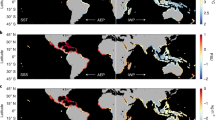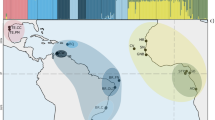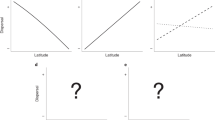Abstract
DURING the winter of 1956 and the following summer, farmers living near the Ninety Mile Beach on the west coast of North Auckland (latitude 34–35° S.) noticed that numbers of unknown fruits and seeds, recognized as of tropical origin, were being washed ashore. Specimens were forwarded to the Botany Division, Department of Scientific and Industrial Research, by Mr. H. G. Halliwell, instructor in agriculture, Kaitaia, for identification.
This is a preview of subscription content, access via your institution
Access options
Subscribe to this journal
Receive 51 print issues and online access
$199.00 per year
only $3.90 per issue
Buy this article
- Purchase on Springer Link
- Instant access to full article PDF
Prices may be subject to local taxes which are calculated during checkout
Similar content being viewed by others
References
Ridley, H. N., The Dispersal of Plants throughout the World (L. Reeve and Co., 1930).
The Christchurch Star-Sun, 12 (April 2, 1957).
Author information
Authors and Affiliations
Rights and permissions
About this article
Cite this article
MASON, R. Dispersal of Tropical Seeds by Ocean Currents. Nature 191, 408–409 (1961). https://doi.org/10.1038/191408a0
Issue Date:
DOI: https://doi.org/10.1038/191408a0
This article is cited by
-
Cloning and characterization of the lignin biosynthesis genes NcCSE and NcHCT from Neolamarckia cadamba
AMB Express (2019)
-
Experiments on dispersal: Short-term floatation of insular anoles, with a review of similar abilities in other terrestrial animals
Oecologia (1984)
-
Aerial dispersal of biological material from Australia to New Zealand
International Journal of Biometeorology (1978)
-
Merremia discoidesperma: Its taxonomy and capacity of its seeds for ocean drifting
Economic Botany (1977)
-
Transoceanic Dispersal in Sophora and other Genera
Nature (1968)
Comments
By submitting a comment you agree to abide by our Terms and Community Guidelines. If you find something abusive or that does not comply with our terms or guidelines please flag it as inappropriate.



